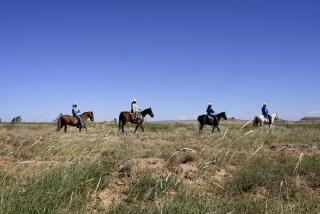American Indian Powwow Unites Present With Past
- Share via
A tepee appeared on the neatly manicured lawn outside Sacred Heart School in Ventura Sunday as more than 300 people celebrated American Indian culture in an intertribal powwow.
The powwow, once a symbolic ritual to mark success in tribal warfare, united representatives from 47 tribes in Ventura County for feasting and dancing.
“There’s a lot of things to being an Indian besides a state of mind,” said Bob Peterson, chairman of the board of the directors for the Native American Indian Inter-Tribal Assn. of Ventura County.
Organizers hope to hold the powwow and other fund-raising events at least twice a year, Peterson said.
The nonprofit association was formed just last year to give Indians a social outlet, but leaders said they also want to fill a void in the educational system. Although the nearest reservation is in Santa Barbara County, up to 6,000 people in Ventura County identify with Indian culture but have no communal land to call home, Peterson said.
Peterson, who is part Ogalala Sioux, said he came to Ventura County from Burbank and recently began researching his heritage so that he could pass it on to his children.
The intertribal association he leads sponsored the event to raise money for programs for free tutoring, counseling and information about Indian culture through the California Indian Education Center in Ventura.
Female dancers drew bright fringed shawls around themselves and swayed to a steady drumbeat as men chanted and shook percussion instruments made of feathers and gourds.
Like Peterson, many who gathered were trying to regain part of their culture.
Kathy McCullen, 36, of Camarillo pulled a red shawl around her 4-year-old daughter Amber before they rose to do a traditional shawl dance. As McCullen rocked silently to the drums, she imparted to her daughter movements that have been performed for generations but that she only recently had learned.
“I’m trying to regain an important part of our heritage that skipped my generation,” said McCullen, a Choctaw.
“You have to know what your roots are,” said Ken Yackytooahnipah, a Comanche from Oklahoma and one of the organizers of the powwow.
More to Read
Sign up for Essential California
The most important California stories and recommendations in your inbox every morning.
You may occasionally receive promotional content from the Los Angeles Times.













